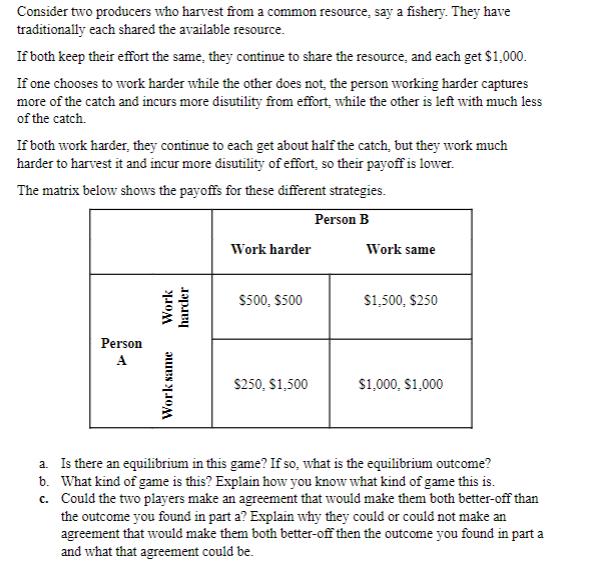Answered step by step
Verified Expert Solution
Question
1 Approved Answer
Consider two producers who harvest from a common resource, say a fishery. They have traditionally each shared the available resource. If both keep their

Consider two producers who harvest from a common resource, say a fishery. They have traditionally each shared the available resource. If both keep their effort the same, they continue to share the resource, and each get $1,000. If one chooses to work harder while the other does not, the person working harder captures more of the catch and incurs more disutility from effort, while the other is left with much less of the catch. If both work harder, they continue to each get about half the catch, but they work much harder to harvest it and incur more disutility of effort, so their payoff is lower. The matrix below shows the payoffs for these different strategies. Person B Person A Work harder Work same Work harder $500, $500 $250, $1,500 Work same $1,500, $250 $1,000, $1,000 a. Is there an equilibrium in this game? If so, what is the equilibrium outcome? b. What kind of game is this? Explain how you know what kind of game this is. c. Could the two players make an agreement that would make them both better-off than the outcome you found in part a? Explain why they could or could not make an agreement that would make them both better-off then the outcome you found in part a and what that agreement could be.
Step by Step Solution
★★★★★
3.45 Rating (161 Votes )
There are 3 Steps involved in it
Step: 1

Get Instant Access to Expert-Tailored Solutions
See step-by-step solutions with expert insights and AI powered tools for academic success
Step: 2

Step: 3

Ace Your Homework with AI
Get the answers you need in no time with our AI-driven, step-by-step assistance
Get Started


